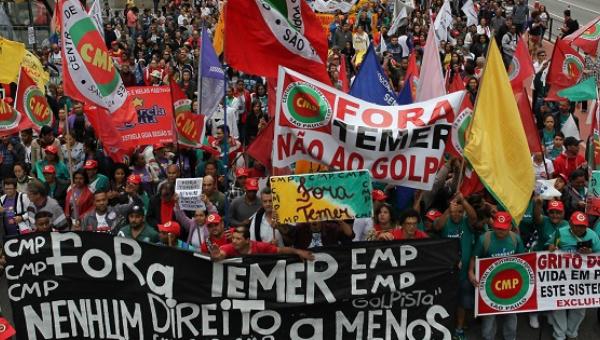The protesters denounced cuts to social programs and demanded protection of human rights on the ocassion of the celebration of Brazilian Independence Day
Tens of thousands of demonstrators took to the streets Wednesday, September 7 in over a dozen Brazilian cities for a national day of action dubbed the “Cry of the Excluded” to protest the country’s unelected government as President Michel Temer made his first public appearance one week after taking office.
Coinciding with Brazilian Independence Day and marked by shouts of slogans like “Out with Temer,” the protesters denounced cuts to social programs and protection of human rights expected under the newly-inaugurated conservative government, which already began to implement an aggressive neoliberal agenda during its “interim” three months in office.
“This September 7 is quite different because the people are living a coup,” Silvana Conti, a candidate with the Communist Party of Brazil in Porto Alegre, said in a statement, citing the widely-repeated criticism of the impeachment process against ousted President Dilma Rousseff as a parliamentary coup. “It is important that the Brazilian people show that they are not accepting an illegitimate government and will not leave the streets until a return to democracy.”
When Temer made an appearance accompanied by his wife Marcela in Brasilia for the Independence Day parade, he was met with cries calling for his removal, local media reported. It was his first public appearance in Brazil since his speedy inauguration on August 31 following the 61 to 20 vote in the Senate to impeach Rousseff, and the hostile greeting echoed the reception of boos he received during the opening ceremonies of the Olympic Games in Rio last month.
Meanwhile, protesters also flooded in the streets in Rio de Janeiro, Sao Paulo, Belo Horizonte, Porto Alegre, Recife, Campo Grande, and several other locations. Solidarity protests were also held internationally, including in London.
“They did not calculate well the opposition there would be against the withdrawal of workers’ rights,” said Lindbergh Farias, senator with Rousseff’s Workers Party, during the demonstrations in Rio, Folha de Sao Paulo reported.
In recent days, labor unions and social movements have come together to reject Temer’s plans for the country, which include lifting restrictions on foreign land ownership, cutting social programs, and privatizing the country’s natural resources, including rich offshore oil reserves. Temer has also moved toward cozier relations with the United States after years of independent foreign policy favoring South American regional integration under Rousseff and her predecessor Luiz Inacio Lula da Silva.
On Monday, September 5, Brazil’s largest social movement, the Landless Worker Movement, or MST, occupied government offices in Brasilia to demand agricultural issues be addressed, while an estimated 12,000 protesters took to the streets in various actions across the country to echo demands for agrarian reform and guaranteed access to farmland for landless rural people.
Social movements have vowed to continue to protest the so-called coup against Brazilian democracy while fighting to protect the social gains won over more than a decade of Worker Party governments.
“Michel Temer’s government claimed that once the impeachment was approved, the country would be at peace. What we witnessed was a strong reaction because society realized that a gang of corrupt (politicians) condemned an innocent person,” Raimundo Bonfim of the Central Popular Movements told Folha. “And since then there have been protests against the neoliberal agenda.”
Taken from http://www.telesurtv.net/english
 Escambray ENGLISH EDITION
Escambray ENGLISH EDITION






Escambray reserves the right to publish comments.